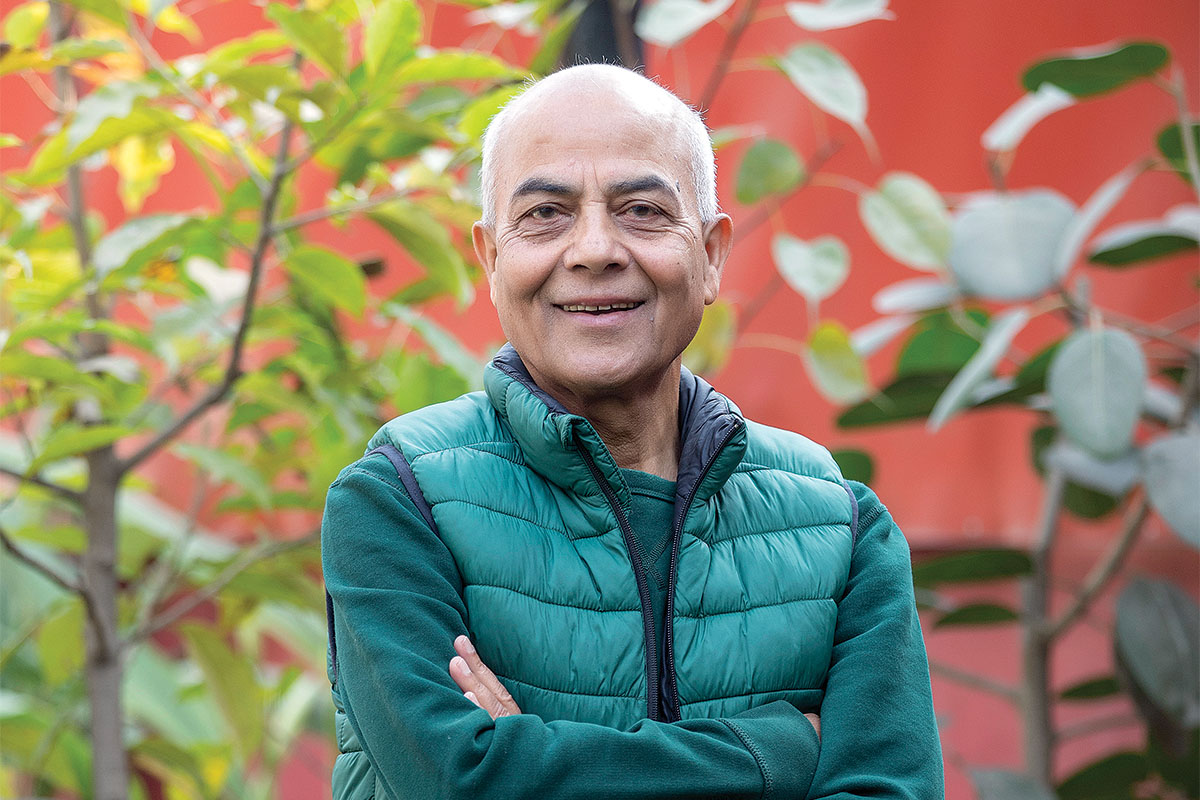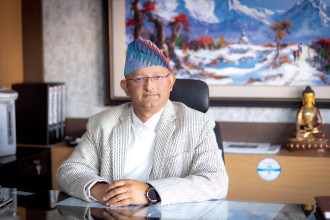
Bhojraj Pokharel’s life is a story of resilience, determination and an unwavering belief in democratic values. Born and raised in the remote hills of Khotang, he grew up in a world where education was a privilege, not a given. His early years were defined by simplicity, struggle and an unrelenting pursuit of knowledge. From scribbling lessons on makeshift slates with charcoal sticks to walking miles just to attend school, Pokharel’s childhood shaped his deep appreciation for hard work and the power of learning. Despite the challenges of adjusting to formal schooling – especially struggling with English at first – his perseverance set the foundation for a remarkable career in public service.
Rising through the ranks of Nepal’s government, Pokharel served in key ministries including health, home affairs and local government, before taking on the pivotal role of Chief Election Commissioner from 2006 to 2008. His tenure coincided with the historic 2008 Constituent Assembly elections; an event that marked Nepal’s transition from monarchy to democracy. Leading the electoral process during a turbulent time required navigating political complexities, bureaucratic hurdles and immense pressure. Yet, his commitment to fairness and transparency ensured that the elections remained credible and inclusive, earning him both national and international recognition. His leadership helped establish Nepal’s Election Commission as a model institution for democratic governance.
His expertise in electoral integrity and democratic processes soon gained global attention. In 2010, he became the first Nepali appointed by the United Nations to a high-ranking international role, overseeing the self-determination referenda in Southern Sudan and the Abyei area. His career, spanning governance, reform and institutional empowerment, is a testament to the transformative power of education, ethical leadership, and service.
In this edition of Business 360, Pokharel reflects on five things that have impacted his work and life.
A childhood etched in simplicity and struggle
I was born in Khotang, a remote district in eastern Nepal. My childhood was vastly different from the fast-paced, technology-driven world of today. Life in the village was simple yet demanding, and education was a privilege earned through perseverance.
Our school was a humble structure in the middle of a vast landscape but it was the centre of our world. We wrote on slates made from leaves and soil, using charcoal sticks as pens. These crude tools were our gateway to knowledge. Our teacher – a man of immense dedication – taught us five subjects, even though his English was limited. What he lacked in language skills, he made up for in mathematical brilliance, breaking down complex arithmetic, geometry and algebra in ways we could grasp.
My father, a teacher himself, deeply valued education. At ten, I left home to study under his guidance, an experience that reinforced my belief in the power of learning. He wanted me to follow in his footsteps and teach the next generation but my journey took a different path.
The transition to a formal school in seventh grade was daunting. I barely knew the English alphabet, and being older than my classmates made the experience even more challenging. But my mother, a pillar of strength, ensured I continued my studies despite the demands of farm life. Looking back, those difficult years taught me the importance of resilience, perseverance and the lifelong impact of education.
Pushing myself beyond my limits
Moving from the simplicity of village life to the structured world of higher education was overwhelming, both financially and emotionally. My father sacrificed a lot to send me to college, believing in my potential despite the uncertainty ahead.
Initially, I was lost. I spent over a year in a master’s programme, struggling to find my footing. Then came a turning point – a gruelling seven-day trek to Kathmandu in search of better opportunities. With financial pressures weighing on me, I worked while studying, trying to balance my responsibilities. Commerce became my field of choice, though adjusting to urban life and academics was far from easy.
At Saraswati College, I attended evening classes after work, commuting long hours and pushing myself beyond my limits. But the hunger for knowledge kept me going. Every step forward – no matter how small – felt like a victory.
Governance is not just about policies, it is about people
Life has a way of testing you when you least expect it. My academic journey was filled with uncertainty and self-doubt. Initially, I had no clear vision of what I wanted to do. But when I found my passion in economics at Tribhuvan University, everything changed. Excelling in my studies opened doors, and soon I found myself in research, analysing economic systems and policies.
Yet, my heart was drawn to public service. I joined a village development initiative, working closely with communities to improve their quality of life. That experience reshaped my outlook; I realised. This realisation led me to law, where I could advocate for justice and systemic change.
“My journey - from a small village in Khotang to the highest corridors of governance - has reinforced my belief that challenges can be overcome with perseverance and purpose. The road is not easy but if you walk it with conviction, it will always lead somewhere meaningful”
Becoming Chief Election Commissioner was another defining moment. The responsibility was immense, requiring me to navigate volatile political landscapes while ensuring the integrity of Nepal’s electoral process. It was a role that demanded patience, strategic thinking and above all, an unwavering commitment to democracy.
Pushing for efficiency, transparency and accountability
Working within Nepal’s bureaucracy was like walking a tightrope, balancing stability with the need for reform. Systems resisted change, clinging to outdated procedures and rigid hierarchies. But I was determined to push for efficiency, transparency and accountability.
One early experience in Solukhumbu exposed me to the deep inefficiencies within government structures. A simple request was buried under layers of red tape, making progress painfully slow. This only strengthened my resolve to cut through bureaucratic barriers and empower local communities.
Nepal’s transition from monarchy to democracy was another major challenge. Political instability after 1990 required leaders who could navigate uncertainty and build consensus. As I worked to reform institutions, I faced resistance from senior colleagues who preferred the status quo. Some even predicted my tenure would be short-lived. But experience, judgement and a commitment to service kept me moving forward.
One of my toughest battles was overhauling Nepal’s telecommunications sector which was plagued by monopolies and inefficiencies. The goal was simple: make communication accessible to all. Achieving it, however, meant confronting vested interests and outdated policies. With support from like-minded reformers, we were able to democratise telecommunications, connecting Nepal to the world.
Challenges can be overcome with perseverance and purpose
My time as Chief Election Commissioner was defined by my unwavering belief in electoral integrity. There were moments when the Commission’s authority was challenged; political parties and international organisations threatened boycotts, attempting to undermine the process. But I stood firm. Transparency, accountability and fairness were non-negotiable.
The Election Commission of Nepal ultimately earned recognition from the United Nations as a credible institution. That validation was not just a personal achievement; it was a testament to the power of integrity and steadfast leadership.
Looking back, my journey – from a small village in Khotang to the highest corridors of governance – has reinforced my belief that challenges can be overcome with perseverance and purpose. Now, my mission is to share these experiences and inspire others to believe in their dreams, no matter how distant they may seem. The road is not easy but if you walk it with conviction, it will always lead somewhere meaningful.




-1738138055.jpg)

-1733132621.jpg)